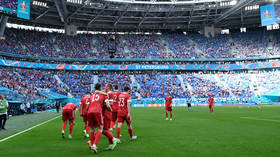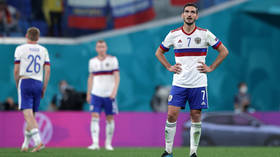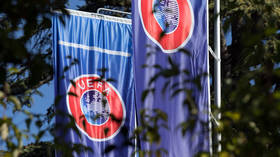Russian football boss comments after discussions on Asian move
The president of the Russian Football Union (RFU), Aleksandr Dyukov, has acknowledged that the current sanctions imposed by European governing body UEFA could lead his organization to move to the Asian Football Confederation (AFC).
Russian national teams and football clubs are currently banned from international competitions due to UEFA and FIFA sanctions initially imposed in February because of the conflict in Ukraine.
The situation has led to increasing talk of the RFU switching to competitions under the auspices of the AFC.
After an RFU executive committee meeting in Moscow on Friday, Dyukov said that the AFC is “currently ready to accept us.”
“Naturally, no one is ready now to give a written guarantee that we will be accepted, but they are ready to consider our appeal and the guarantee of admission is high. This requires an appeal and a decision by a majority vote,” Dyukov told reporters.
“As for the change of confederation, formally it does not apply to FIFA. Informally, the consent of FIFA will be required. At the moment, we have information that FIFA will not be against the transfer of the RFU from UEFA to the AFC.”
After the idea was tabled at the meeting, RFU vice-president Igor Kamenskoy said a decision on whether to attempt to make the transition would be discussed again via videoconference on December 27.
As explained by Dyukov, the RFU has a “window of opportunity” until December 31 to request its withdrawal from UEFA so that the Russian men’s national team could potentially enter the qualifying stages in Asia for the 2026 FIFA World Cup set to be held in the USA, Canada, and Mexico.
“If we don’t do this now, and later decide on the transition, then the next tournament for the national teams will be a cycle from 2027. Delaying the decision by a few days means that the national teams could lose four years,” Dyukov said.
“Since the summer, it was understood that there was a possibility of a transition. But we had time. No one has ever left UEFA. If you look at their regulations, they simply did not allow it, and there is no clearly defined ‘what if’ algorithm.”
“There are a number of conditions,” added the RFU’s secretary general, Maxim Mitrofanov.
“The letter does not mean an automatic exit. If the conditions, among other things, are not met, then the exit [from UEFA] will not take place.”
Dyukov stated that “unfortunately” he sees the RFU ideologically “at odds with Europe.”
“Politics is in first place [in Europe], football has faded into the background. We saw this at the World Cup in Qatar. Today they [Europe] are not satisfied with this situation, tomorrow they will ask questions about human rights, the day after tomorrow it will turn out that we are not energetically supporting the LGBT movement, and this will also be the basis for a boycott,” Dyukov added.
Asked if the prospect of the RFU moving to the AFC could be considered a final warning to UEFA, Dyukov stressed that “this is not a situation where we are trying to blackmail someone.”
“First of all, we must think about ourselves, about the players and fans… UEFA has done a lot for the development of football in the world, in our country. Despite the suspension, they helped us a lot with the funding of various programs.
“We believe that, despite the lack of opportunity to play, we have partnership relations, [and] we respect the leadership of UEFA.
“European national football associations are under pressure from the media and politicians. Everyone understands that sport should be [kept] out of politics, but they can’t do anything,” Dyukov added.
“Now UEFA sees no reason to reconsider the decision [on the suspension]. They are waiting for the stabilization of the political situation. At the same time, it is not a fact that in the event of stabilization it will be possible to immediately remove all restrictions.”
When reminded that AFC members Japan and Australia could be considered “unfriendly” countries, Dyukov was unable to give guarantees that such countries would not refuse to play against Russia – as was seen in the Qatar 2022 World Cup playoffs with the likes of Poland and Sweden.
“But if we compare the situation in Asia and Europe, it is different,” Dyukov said.
“When there are 48 associations in Asia and two or three of them say they won’t play with us, it’s one thing. When there are more than half of them, they begin to dictate terms.”
Whether in Europe or Asia, Dyukov argued that it is better to perform under neutral status than not at all.
“Everyone wants to perform under their own flag and with an anthem, but if you have to choose between not playing at all or playing without a flag and an anthem, then it’s better to play without a flag and an anthem,” Dyukov said.








Comments are closed.